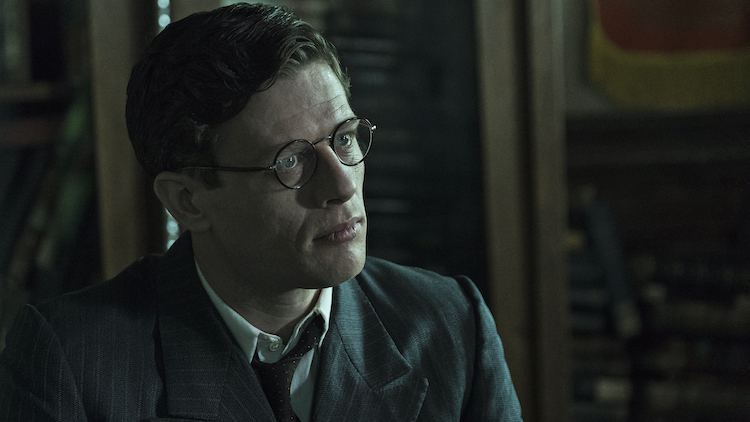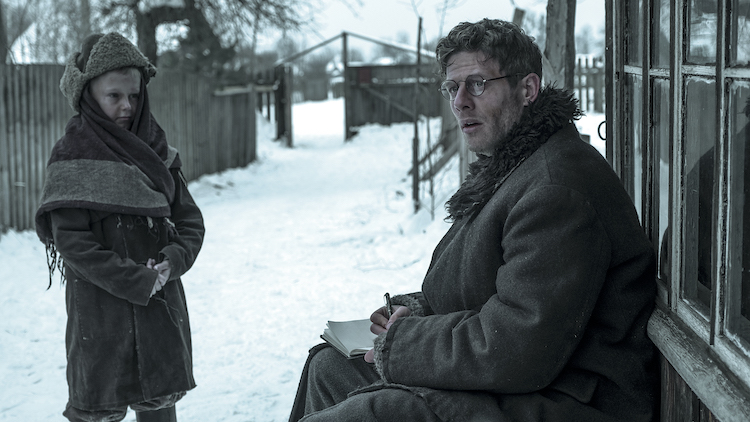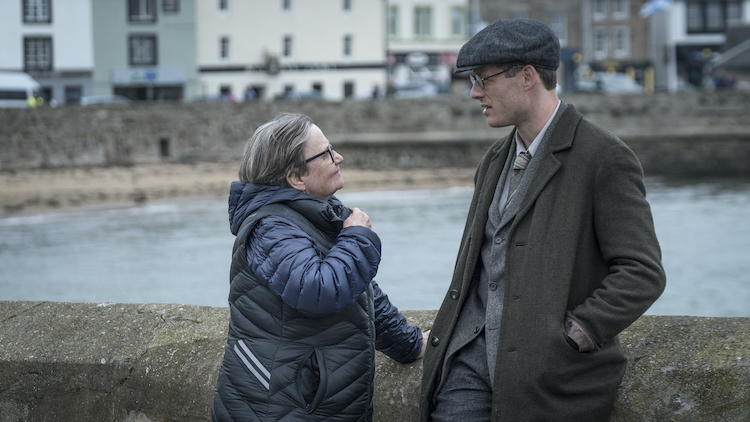I often have the pleasure of speaking with some great people, and James Norton, who plays the title role in MR JONES, is the latest. MR JONES covers the true story of dogged journalist Gareth Jones, who investigates the Soviet Union’s involvement in Ukraine during the early 1930’s. The incredible story feels shockingly, and disappointingly, relevant to today’s situation in which people in power attempt to prevent the media from revealing information that could lead to their loss of that power.
I spoke with James, who has been in London since the lockdown began, but is now able to head out to the countryside on occasion for a much-needed change in scenery. I, too, look forward to getting out into nature a bit more. After engaging in a little small talk, we dive into the question-answer portion of the call.

I’m always interested in a good origin story; what first attracted you to the acting profession?
“When I was very, very young, I was sort of endlessly writing little plays and making my friends perform in them and showing them to my parents and relatives and things. I don’t really know where it came from because none of my family are from this business. It was just there from a very early age. I was very lucky when I was at university to meet some fantastic directors who kind of encouraged me to take it on professionally. I guess the rest is history, and I’ve been incredibly lucky since then to be able to continue with the love affair, which seems to just get richer and richer as I carry on.”
You were just born with it.
“It’s weird, I don’t know. My mum’s a nurse and then a teacher, sort of an academic, and my dad’s a college lecturer, and my sister’s a medic, so none of them had anything to do with this business. It’s come out of nowhere.”
How did your parents react when you first told them that acting was your career choice?
“I think they were a bit bemused, but they’ve always been very supportive, so they sort of hung out on the sidelines, and have never been dismissive or dissuading of it.
“Since moving into more television and film, my dad, and now actually my mum and my sister, but particularly my dad, have been supporting artists and extras in pretty much everything I’ve done. My dad loves it. He comes on set and clucks around and gets dressed up. Because he’s my dad, they treat him very well. Yeah, he’s enjoying it far too much. It’s quite funny.”
Do you speak any languages other than English?
“No, I definitely don’t speak Welsh. I definitely don’t speak Russian. I have now done three jobs, I think, over the last few years where I played a Russian speaker, fluent speaker, and I don’t know why. I think maybe one has led to the other, and now I’m the go-to guy for English speakers who speak fluent Russian. I can say a bizarre number of things in Russian without really knowing what they mean. I’ve tried it out when I’ve been to Russian-speaking countries, and I just start talking about bread and tree bark, and they look at me in a very bemused way.”
How challenging is it to master those accents and learn that language just in the context of the script?
“It is challenging, but you get used to it. It’s like learning music really; if you don’t read music, you can still learn a tune. It’s sort of similar. I learned the sounds and the intonation. So, you learn your own lines in a kind of music sense, and then you learn sounds from their lines which you’re meant to react to or would signify the end of their sentence, and somehow in that kind of craziness you find a semblance of a back-and-forth [dialogue]. It is challenging.
"I had some amazing help, though. What was amazing about the MR JONES set was that we had Russian speakers from Ukraine and Ukrainian speakers, obviously, and then we had Czech speakers - our first AD was from Czechoslovakia, and Agnieszka speaks Czech with him - and then we had Polish, and then we had English. We had this like circus of languages, and very little English was spoken, and I would sit in the middle having absolutely no idea what was being said. Very occasionally, some AD would lean in and say, “Would you like a cup of tea?” I would be like, “Yes, please!” That was my life for about two months.”
 What are the most valuable lessons you’ve learned that have been able to help you to improve your craft?
What are the most valuable lessons you’ve learned that have been able to help you to improve your craft?
“That’s a very interesting question. I think our industry and our craft is really understanding human beings and allowing yourself into their world, their thoughts, and their kind of private lives. I guess we bandy around the term "empathy" a lot, and I think it can be overused, but allowing yourself into those headspaces and those people’s lives that you wouldn’t otherwise necessarily start to excavate and understand, that leads to incredible empathy.
"I’m a type one diabetic, and when I found out I was diabetic, I suddenly started to hear people’s stories about health conditions and chronic conditions, which I hadn’t necessarily listened to or paid attention to before, and that then allows me an understanding if ever I play someone who has a chronic health condition. I guess it’s like the tapestry of your own life and the ups and downs, the highs and lows, they are the things that inform the work. I hope the older you get, the more ups and downs, the richer the tapestry, the better you get at the job. I would hope that might be the case.”
In researching for this role, what material did you study, and what did you learn that was interesting about the character?
“I mean there’s an enormous amount of literature around the Holodomor, although not very much about Gareth Jones. Criminally few people in this country, and I think globally, know about him, and not many people know about the Holodomor, which is really also unjustifiable, considering the number of people who lost their lives and the scale of the crime. I did lots of research, read various books on Gareth. Gareth’s relatives have compiled an incredible resource online. They got together all his notebooks and letters and accounts of him for his contemporary journalists, and that was an amazing resource for us. We had the family on hand, advising us and making sure we were on the right track, as far as he was concerned. Ultimately, Agnieszka and I had to find our Gareth whilst honoring the memory of him because we’re not in the game of mimicry. We have to sort of let the character live and breathe in isolation. It was an interesting challenge, and obviously, we were acutely aware of the man himself and honoring his memory, and I hope that we did him justice. I think the family were pleased.”
The scene where you were running in the snow seemed like that would have been challenging, not to mention, really cold. Would you talk about shooting that scene, and in what ways was this role more physically demanding than you may have originally anticipated?
“The whole stuff in the snow was very challenging because basically it was really, really cold. We had this weather front called the Beast from the East which was this crazy, freezing-cold weather coming in from Siberia. We had to contend with the weather, which was genuinely -15 with the wind-chill of -25, which was really, really cold, and then Agnieszka wanted it to feel real, so I was there in these period rags, basically, this peasant’s coat, and the wind was battering us, and I was genuinely freezing. If you let any of your extremities out for longer than about 30 seconds they would start to go completely numb. I had electronic thermals on underneath my clothes, battery powered thermals, it was so cold.
“The scene where I was running in the snow was unbelievably exhausting. Agnieszka had a reference, I think it’s called DIAMONDS OF THE NIGHT, and it’s a scene when this character runs and the camera just keeps on him on him on him, and he runs away from these soldiers, and it was a reference that Agnieszka showed to me the night before. She said they set this amazing track up and said, “You’re gonna run and run and run,” and she just made me do it once. The exhaustion at the end, and I was nearly sick, that was all absolutely real. She drives a hard bargain, Agnieszka, but you love and respect her so much that you do anything for her.”

Would you talk about working with her?
“She is a master of her craft and is far more than just a director. What was really funny being in Poland with her, she’s obviously an incredibly celebrated director, Oscar-nominated, and basically one of the leading directors in Poland right now, but she’s also more than that. She’s a proper sort of icon; she’s a real celebrated figure of the political left in Poland, and people stop her on the street. While they do talk about her work, they also mostly talk about her activism and the kind of political principles which she constantly, doggedly is getting out there. [She] is a force for change, so inspirational, incredibly intelligent, formidable, and terrifying.
“We would often end up in the hotel at the end of the night in the snow in Ukraine with a bottle of vodka and a plate of herring, and we would invariably have fairly heated conversations, which would sometimes turn into arguments because she loves debate. She’s a proper conversationalist. She’s fiercely intelligent and principled, and just also incredibly warm and loving. I trusted her, which meant I was prepared to give her my soul, which is pretty much what every actor wants from a director.”
Has playing this role changed you in any way or had any lasting impact on you?
“I hope that I learned from Gareth and his amazing integrity, his lust for life, and his principles. He was someone who really led his pursuit of truth against the risks. The reaction to the movie, particularly from journalists, has been really humbling because we’re all too aware of how close this film is to the current political climate that we are in. Big totalitarian regimes manipulating truth to maintain their stranglehold on power is unfortunately all too familiar nowadays, as it was in the 30’s. Seeing and bearing witness to Gareth’s extraordinary journey and bravery, which he went through in order to stand up to that type of power-hold, was just an inspiration. I guess if I can take any of that type of integrity and that selflessness with me, then I will have learned something. And similarly, if the film has in some ways inspired any future Gareth’s, then that would be a wonderful thing. What I’m very happy and proud about is that there are journalists who have really reacted well to the film and are very grateful that the story is being told, so that’s a fantastic thing. So yeah, you take a little piece of every role that you do, and if it’s someone like Gareth, someone of that kind of soul, hopefully you take a little more than usual.”
After tackling this role of Gareth do you think you could ever be a journalist? Why or why not?
“I’ve always said that I think actors and journalists aren’t that dissimilar, in that we both love information and learning. We dedicate our lives to sort of being inquisitive, not sitting still. We’ve always described Gareth as a man in motion and never kind of settling, never wanting a monotonous life. Once he conquered one story, one head of state, he wants to interview the next. Similarly, with actors I think you play one role and you completely immerse yourself in that, and then you want to take on a completely different role and learn about a whole different period of history or a country or whatever it might be. So, in that sense, there is definitely a similarity between actors and journalists. I don’t know if I’d be brave enough or selfless enough to be as extreme as Gareth was in his kind of stubbornness. As far as we know, he never really had a relationship. Would I end up a Gareth Jones, one the most principled investigative journalists in pursuit of empirical truth, or would I end up as something entirely different? Probably somewhere in between. I certainly have a newfound respect for journalists having done this film.”
I don’t see the need for James Norton to change professions anytime soon, as I believe he has a bright future doing exactly what he’s been doing. A powerful depiction of one man’s drive to uncover the truth, MR JONES is currently out on digital, and will be coming out On Demand July 3.
